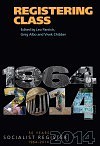Socialism
Foreword to The Necessity of Social Control
István Mészáros is one of the greatest philosophers that the historical materialist tradition has yet produced. His work stands practically alone today in the depth of its analysis of Marx’s theory of alienation, the structural crisis of capital, the demise of Soviet-style post-revolutionary societies, and the necessary conditions of the transition to socialism. His dialectical inquiry into social structure and forms of consciousness—a systematic critique of the prevailing forms of thought—is unequaled in our time. No less a historical figure than Hugo Chávez referred to him as the “pathfinder” of twenty-first century socialism.… The role of this foreword is to help to put his system of thought as a whole, and this book in particular, in their historical contexts, while illuminating some of the distinctive concepts governing his analysis. | more…
The following reflections deal with a permanent and fundamental challenge that has confronted, and continues to confront, all popular movements struggling against capitalism. By this I mean both those of movements whose explicit radical aim is to abolish the system based on private proprietorship over the modern means of production (capital) in order to replace it with a system based on workers’ social proprietorship, and those of movements which, without going so far, involve mobilization aimed at real and significant transformation of the relations between labor (“employed by capital”) and capital (“which employs the workers”).… Taken as a whole, many of these movements can be termed “movements toward socialism.” | more…
Everyone understands that it is impossible to achieve the vision of socialism for the twenty-first century in one giant leap forward. It is not simply a matter of changing property ownership. This is the easiest part of building the new world. Far more difficult is changing productive relations, social relations in general, and attitudes and ideas.… To transform existing relations into the new productive relations, we need first of all to understand the nature of the existing relations. Only then can you identify the mechanisms by which the new relations can be introduced. At this time, there is a great variety of experiments and approaches to changing productive relations which are being pursued. There is no attempt to set out specific proposals here but only to provide the framework in which such changes should be explored in order to move toward socialist productive relations. | more…
The propositions put forward here—and many other possible ones—have no place in the dominant discourse about “civil society.” Rather, they run counter to that discourse which—rather like “postmodernist” ravings à la Negri—is the direct heir of the U.S. “consensus” ideological tradition. A discourse promoted, uncritically repeated, by tens of thousands of NGOs and by their requisite representatives at all the Social Forums. We’re dealing with an ideology that accepts the existing regime (i.e. monopoly capitalism) in all its essentials. It thus has a useful role to play on behalf of capitalist power. It keeps its gears provided with oil. It pretends to “change the world” while promoting a sort of “opposition” with no power to change anything. | more…

This 51st annual Socialist Register completes the investigation of class formation and class strategies on a global scale begun with last year’s volume. Deploying an understanding of class as an historical social process—rather than an abstract sociological category or statistical artifact—the essays here investigate the concrete ways that working classes are being made and remade in the struggles against neoliberalism, austerity, and authoritarian governments. Taking stock of the changing balance of class forces as well as old and new forms of workplace, household and political organization, they uncover the class strategies being debated and adapted in different zones of the world. | more…

The essays in this book, many of which are either out-of-print or difficult to obtain, were written between 1955 and 1963 during one of the most fertile periods of E. P. Thompson’s intellectual and political life, when he wrote his two great works, The Making of the English Working Class and William Morris: Romantic to Revolutionary. They reveal Thompson’s insistence on the vitality of a humanistic and democratic socialism along with the value of utopian thinking in radical politics. Throughout, Thompson struggles to open a space independent of official Communist Parties and reformist Social Democratic Parties, opposing them with a vision of socialism built from the bottom up. Editor Cal Winslow, who studied with Thompson, provides context for the essays in a detailed introduction and reminds us why this eloquent and inspiring voice remains so relevant to us today. | more…
Travelers from the United States to Cuba cross more than ninety miles of sea: they cross decades of history. They may be limited to one suitcase, but they carry trunks full of ideological baggage, including biases about Cuba, beliefs about communists, commitments as to what a good society should be like, and a collection of conventional poli-sci formulas about power, government, and human behavior…Members of delegations usually have planned itineraries, visiting various institutions and cultural events. They will learn about health care, education, cultural and sport resources, commitment to an ecological pathway of development, urban agriculture, equitable distribution through the rationing system, full employment, formal aspects of the political and judicial systems, achievements in gender and racial equality. These are all real, and demonstrate how far a poor country can go with so little. But it is obviously not the full story. There is nothing sinister in this. These are the things in which Cuba has pioneered, and of which Cuba is most proud and eager to show the world…My own experience has been that the more committed revolutionaries have the most serious, complex, and thoughtful criticisms, while counterrevolutionaries mostly complain about particular hardships or unpleasant incidents. | more…

John Bellamy Foster is a leading exponent of the theoretical perspective that continues in the tradition of Baran and Sweezy’s Monopoly Capital. This new edition of his essential work, The Theory of Monopoly Capitalism, is a clear and accessible explication of this outlook, brought up to the present, and incorporating an analysis of recently discovered “lost” chapters from Monopoly Capital and correspondence between Baran and Sweezy. It also discusses Magdoff and Sweezy’s analysis of the financialization of the economy in the 1970s, ’80s, and ’90s, leading up to the Great Financial Crisis of the opening decade of this century. | more…

For fifty years, the Socialist Register has brought together some of the world’s leading radical thinkers to address the most pressing issues of the day. Independent, searching, and erudite analysis is the hallmark of the Socialist Register, and this fiftieth-anniversary issue is no exception. Contributors to Registering Class examine some of our assumptions about class in the light of the global economic crisis and the many forms of resistance it has produced. | more…

In this slim, insightful volume, noted economist Samir Amin returns to the core of Marxian economic thought: Marx’s theory of value. Amin defends Marx’s theory of value against its critics and also tackles some of its trickier aspects. He examines the relationship between Marx’s abstract concepts—such as “socially necessary labor time”—and how they are manifested in the capitalist marketplace as prices, wages, rents, and so on. He also explains how variations in price are affected by the development of “monopoly-capitalism,” the abandonment of the gold standard, and the deepening of capitalism as a global system. | more…

Renowned political economist Samir Amin, engaged in a unique lifelong effort both to narrate and affect the human condition on a global scale, brings his analysis up to the present—the world of 2013. The key events of our times—financial crisis, the emerging nations, globalization, financialization, political Islam, Euro–zone implosion—are related in a coherent, historically based, account. | more…

Is it advisable for one who is not an expert on economic and social issues to express views on the subject of socialism? I believe for a number of reasons that it is.… Clarity about the aims and problems of socialism is of greatest significance in our age of transition. Since, under present circumstances, free and unhindered discussion of these problems has come under a powerful taboo, I consider the foundation of this magazine to be an important public service. | more…






